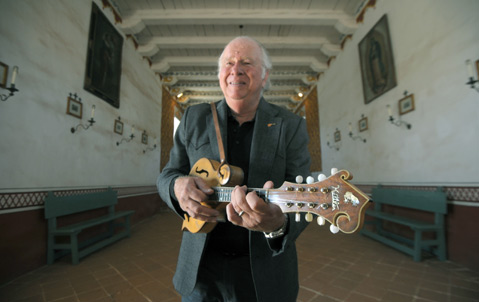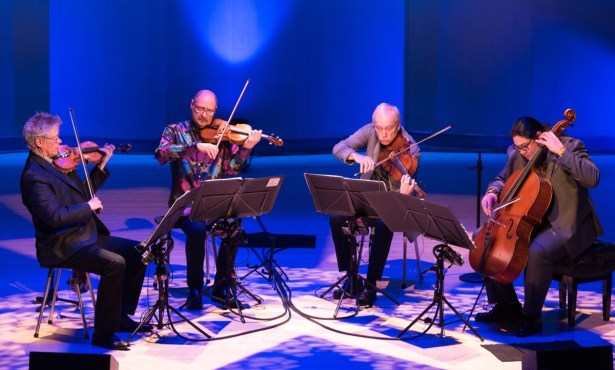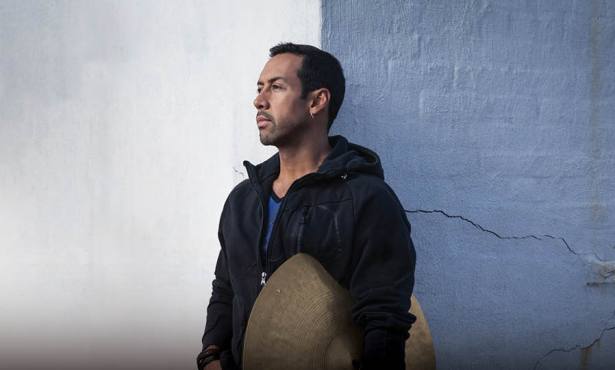Peter Feldmann Celebrates Five Decades of Music
Santa Barbara’s Bluegrass Legend Celebrates 50 Years at the Lobero Theatre

Fifty years: That’s 10 U.S. presidents. It’s also real estate bubbles, recessions, economic booms, gas prices rising and dropping, rising and dropping, and rising, rising, rising. Traffic lights on Highway 101 giving way to widening projects on Freeway 101. Pay phones becoming cell phones. New planets found and old planets lost. Scores and scores of musical fads playing out on records then eight-tracks then tapes then CDs and now MP3s. And through it all, Peter Feldmann has been living a life less ordinary, picking at strings and giving the people of Santa Barbara that sweet, soulful, body-moving American-made music we call bluegrass.
“I feel like I was a different person back then, but I just can’t remember who it was,” laughed Feldmann recently when asked about the origins of a music career that started around these parts in the early 1960s. It was midmorning, and we were catching up on the telephone, me at Independent headquarters here in Santa Barbara and Feldmann at a friend’s apartment in Oakland, taking a break from a jam session that had more or less spilled over from a gig the night before. I had caught him in the middle of a music-motivated road trip in honor of Bill Monroe’s birthday (i.e., the late, great patriarch of bluegrass). It seemed a perfect backdrop for getting the lowdown on Feldmann’s half century of music making. After all, this is a man who cut his chops with the likes of the Seeger family at Chicago’s Old Town School of Folk Music. He also ran the famed Bluebird Café in Santa Barbara and founded Santa Barbara’s Old-Time Fiddlers’ Convention. His band The Scragg Family handled house-band duties for the infamous Red Dog Saloon in Virginia City, Nevada, and provided the soundtrack for the bohemian glory days on Mountain Drive. Be it on the guitar, fiddle, banjo, mandolin, or behind the scenes as a promoter and producer, Feldmann has a story that’s the gritty, glorious, and goodtime-having embodiment of American string music.
“I was just an impressionable kid from Switzerland, and this kind of music was the key to me learning what it meant to be American,” explained Feldmann. “It was like a magic passport.” His family moved to California in 1946, ultimately settling in Santa Barbara in 1957. And, of all the cultural touchstones that could have helped him bridge the gap from newbie immigrant to full-throttle resident, it was the sound and stories of early country and cowboy music that drew him in. As he recalled, it was the twang of a clawhammer banjo and artists like the original Carter Family and Jimmie Rodgers that helped him make peace with his new home. Blues music, folk music, Appalachian string music, hillbilly music, and country-blues music — Feldmann loved all of it. “It was like I discovered gold. I mean, even today, most Americans don’t even know that they have this huge treasure of music right here.”
After flunking out of UCSB in 1960, Feldmann set out for Chicago, where he spent his days working in the Field Museum of Natural History and his free time soaking up everything and everyone at the famed Old Town School of Folk Music on the city’s North Side. The experience, which included regular time with the likes of Pete and Mike Seeger and Tracy Schwarz and Frank Proffitt, turned his growing passion for music into an absolute obsession. “I came back [to Santa Barbara] after having this tremendous music experience, and I wanted to share it with people,” recalled Feldmann. And, well, that is essentially what he has been doing ever since.
It began with an informal “hootenanny” at Orpet Park in 1962 with no PA or major advertising but more than 150 people in attendance. Then, after rejoining the undergrad ranks at UCSB, Feldmann, high on the folk revival and subversion efforts of the times, started the Old Time Music Front, an outfit dedicated to “subverting college kids into listening to old-time traditional American music, warping their minds and doing as much damage as I could.” It was in this role that he started putting on shows in earnest. People like blues legend Mance Lipscomb and folkster John Cohen and Mississippi Fred McDowell all came to town on the circuit between L.A. and San Francisco thanks to Feldmann. Even better, at least for the sake of Feldmann’s personal musical development, the artists would often crash with him at his self-described “shack” in Goleta. “I would just try and learn some licks, put on a show, and then send them on their way. It was a special time,” he said.
Around about 1967, Feldmann and his fellow Scragg Family band members loaded up a red, white, and blue–painted school bus and “took off looking for gigs to play anywhere we could find them.” Their travel saw them all over the West, which included the aforementioned summer engagement as the house band for the Red Dog Saloon, where pay envelopes often included hunks of hashish. And while their rambling ways helped forever seal the band’s reputation as one of the West’s most celebrated string bands, the Scragg Family eventually came to an end in late 1971 when they returned home to S.B. Freshly married and needing to find a way to make money that didn’t involve living in a bus, Peter and his wife at the time, Marianna Mashek, opened the Bluebird Café on the corner of Chapala and Anapamu streets. With live music six nights a week, beer for a quarter, and cover charges of only 50 cents, the Bluebird, though it only lasted five years, was a music hub that is still talked about today. It’s celebrated for the formative role it had in the lives of modern bluegrass legends like David West and his band the Cache Valley Drifters. “I could never do something like that today; it would kill me,” said Feldmann. “But man, I sure wish we had more places like it around here. Young musicians need a place where they can grow from amateurs to professionals.”
In the time since the Bluebird, Feldmann has worn many hats, including record-label owner, elementary school– and college-level music teacher, computer-tech-industry mogul, music journalist, string music historian, and, of course, performer. And while his long road with music lends itself to a certain amount of reflection and what he readily admits is an occasionally “anachronistic” way of thinking, the love of and desire to make bluegrass and all the various varieties of American string music that live under that label have perhaps never been greater for Feldmann. “I don’t know how long this type of music will last,” he opined. “Music always has to come from a culture and reflect a specific set of values and lifestyle. As those lifestyles and attitudes change, the music, in order to survive, has to change, as well. … It will go on, but the question is, what form will it take?” Then, after a pause where he seemed to be reassessing his thoughts, Feldmann added cheerily, “I just feel really blessed to be able to do the things I’ve done. It’s been a lot of fun, and I’m still having a blast doing it.”
4•1•1
Peter Feldmann takes the stage at the Lobero Theatre (33 E. Canon Perdido St.) in celebration of his 50th anniversary of music making this Friday, November 2, at 8 p.m. The lineup includes performances by David West, Byron Berline, Alastair Greene, Tom Ball, and Kenny Sultan. Call 963-0761 or visit lobero.com for tickets and info.



